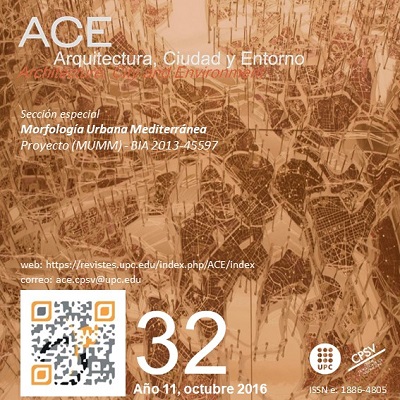Great projects and their social effects. Tendencies to social substitution in urban spaces revalued
DOI:
https://doi.org/10.5821/ace.11.32.3964Keywords:
Great-scale project, urban renewal, displacement.Abstract
Today many Latin American cities are experiencing a transformation process, fragmented urban spaces according to the social composition of its population, redefining centrality and periphery areas. In many cases, these changes are being made on the basis of great public works affecting slums and informal settlements. Process involving a public-private partnership: the State and its urban intervention programs and the market through its financial institutions that encourage investment in areas of increasing urban renewal.
This article takes up the case of the transformations in Posadas city (Argentina), from the works of complementary infrastructure Yacyretá dam. The Dam hydroelectric had provide coastal defenses along the Paraná River, rehabilitating large urban areas and urban links recomposing the city. The set of coastal structures is leading to the emergence of real estate speculation and private investment, as well as new forms of displacement without direct state action.
In the context of these events this research raises a number of questions. Does the new coast margin and vacant land are under dispute between different social sectors?, On what areas of the city is falling property speculation?, The additional works have generated an unprecedented urban renewal?, Are a new pattern emerging of socio-spatial segregation? If so, this pattern has connotations of gentrification? These and other issues are analyzed from a descriptive and exploratory perspective.
Downloads
Published
Issue
Section
License
| INTELECTUAL PROTECTION CRITERIA |
At this moment, it is count with the "Oficina Española de Patentes y Marcas", while global protection it is being processed by the World Intelectual Property Organization (OMPI/WIPO). Nevertheless the International Standard Serial Number Office (ISSN) has given the following numbers ISSN: 1886-4805 (electronic version) and 1887-7052 (paper version). All articles will be peer reviewed, using double blind reviewing. |
| COPYRIGHT |
The article contents and their comments are authors exclusive liability, and do not reflect necessarily the journal editor commitee's opinion. All ACE published works are subject to the following licence CC BY-NC-ND 3.0 ES http://creativecommons.org/licenses/by-nc-nd/3.0/es/ It implies that authors do not hold nor retain the copyright without restrictions but only those included in the licence. |





































